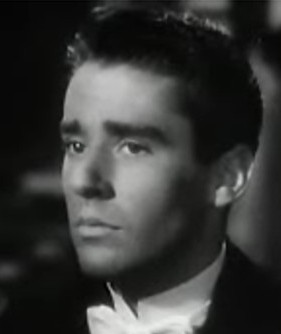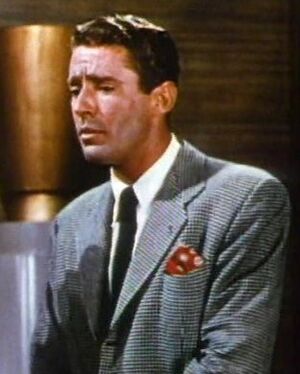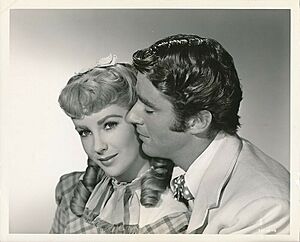Peter Lawford facts for kids
Quick facts for kids
Peter Lawford
|
|
|---|---|
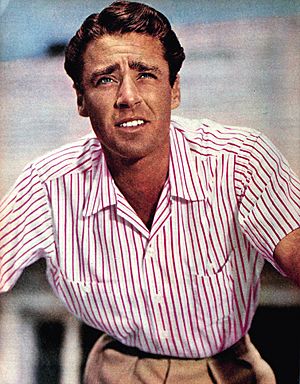
Lawford in 1955
|
|
| Born |
Peter Sydney Ernest Aylen
7 September 1923 London, England
|
| Died | 24 December 1984 (aged 61) Los Angeles, California, U.S.
|
| Citizenship |
|
| Occupation |
|
| Years active | 1930–1984 |
| Spouse(s) |
|
| Children | 4, including Christopher Lawford |
| Parent(s) |
|
Peter Sydney Ernest Lawford (born Aylen; September 7, 1923 – December 24, 1984) was a famous actor from England and America.
He was part of a well-known group of entertainers called the "Rat Pack". He was also related to important political figures, including US President John F. Kennedy and senators Robert F. Kennedy and Edward Kennedy. From the 1940s to the 1960s, Peter Lawford was a big star. He acted in many popular movies. Later in his life, he was often more famous for his life outside of acting.
Contents
Early Life and Childhood
Peter Lawford was born in London, England, in 1923. He was the only child of Sir Sydney Turing Barlow Lawford and May Sommerville Bunny. His parents got married when he was one year old.
Peter's family had connections to important British families. His uncle's wife was related to a Scottish Earl. Another aunt was married to a judge in Australia. An artist named Rupert Bunny was also a relative through his mother's side.
Growing Up
Peter spent his early years in France. Because his family traveled a lot, he did not go to a regular school. Instead, teachers and nannies taught him at home. His education included learning tennis and ballet.
When he was about seven years old in 1930, Peter had his first acting role in an English movie called Poor Old Bill. He also had a small, uncredited part in A Gentleman of Paris in 1931.
His Accident
When Peter was 14, he had a serious accident. His right arm went through a glass door. This caused nerve damage, making it hard for him to use his forearm and hand. He learned to hide this injury later on. Because of his arm, he could not join the military, which his parents had hoped for. So, Peter decided to become an actor. This decision even led one of his aunts to change her will and not leave him a large amount of money.
Acting Career
Starting in Hollywood
In 1938, Peter Lawford was visiting Hollywood when a talent scout noticed him. He took a screen test and got a small role in the movie Lord Jeff.
When World War II started, Peter's family was in Florida. They soon realized they were stuck because their money was in Britain, which was at war. Peter, who was 16, got a job parking cars. When he saved enough money, he went back to Hollywood. He worked as a movie theater usher until he started getting more acting jobs.
Small Roles and Big Breaks
During World War II, many movies were made about the war. Peter often played military characters, though usually in small, uncredited roles. You could see him as a pilot in Mrs. Miniver (1942) and Eagle Squadron (1942).
His first important role in a major movie was in A Yank at Eton (1942). He played a snobby bully in this popular film. He continued to appear in many films, often as a soldier or student.
In June 1943, Peter's career took a big step forward when he signed a long-term contract with MGM, a major movie studio. They signed him for a specific role in The White Cliffs of Dover (1944). He played a young soldier during World War II in this movie.
MGM also gave him an important role in The Picture of Dorian Gray (1945).
Becoming a Leading Actor
Peter Lawford's first main role was in Son of Lassie (1945), which was a big success. He then starred in musicals like Two Sisters from Boston (1946) and It Happened in Brooklyn (1947) with Frank Sinatra.
In 1946, a magazine poll voted him the most popular actor in Hollywood. He received thousands of fan letters each week. With many older actors away at war, Peter became a new romantic star at MGM.
He got great reviews for his role in the musical Good News (1947). He used an American accent for the part and was praised for his performance.
Peter starred with Esther Williams in On an Island with You (1948). He also appeared with Fred Astaire and Judy Garland in Easter Parade (1948), which was a huge hit.
He played Laurie in MGM's movie Little Women (1949) alongside June Allyson and Elizabeth Taylor. He continued to star in many films, including Royal Wedding (1951) with Fred Astaire.
In 1953, MGM let Peter go from his contract. His first movie after leaving MGM was the comedy It Should Happen to You (1954), where he starred with Judy Holliday and Jack Lemmon.
Moving to Television
After his time at MGM, Peter Lawford started working in television. He appeared as a guest star on shows like General Electric Theater and Alfred Hitchcock Presents.
In 1954, Peter married Patricia Kennedy, who was the sister of Senator John F. Kennedy. Peter became a strong supporter and helped raise money for the Senator's campaigns.
Peter had a regular role in a TV comedy show called Dear Phoebe (1954–55), but it only lasted for 32 episodes. He then went back to guest starring on many other TV shows.
He got another main role in a TV series called The Thin Man (1957–59). This show was based on a famous detective novel and ran for 72 episodes.
The Rat Pack and Politics
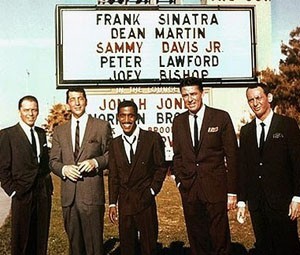
In 1959, the famous singer Frank Sinatra invited Peter Lawford to join a group of entertainers known as the "Rat Pack". Sinatra also helped Peter get a role in the movie Never So Few (1959).
Peter Lawford and Frank Sinatra then starred together in Oceans 11 (1960). Peter had first heard the idea for the movie from a director. He bought the rights to the story in 1958.
In 1960, Peter became a U.S. citizen. This allowed him to vote for his brother-in-law, John F. Kennedy, in the presidential election that year. Peter and other members of the "Rat Pack" actively helped campaign for Kennedy and the Democratic Party. Frank Sinatra even playfully called him "Brother-in-Lawford" during this time.
Peter also acted in other films like Exodus (1960) and The Longest Day (1962), a war movie with many famous actors.
Becoming a Producer
In 1961, Peter Lawford and his manager, Milt Ebbins, started their own production company called Chrislaw Productions. It was named after Peter's son, Christopher. They made a deal to produce movies and TV shows. One of their first projects was the action film Johnny Cool (1963).
Peter continued to act, starring with Bette Davis in Dead Ringer (1964). He also produced the film Billie (1965).
Around this time, Peter had a disagreement with Frank Sinatra. Sinatra replaced him in the movie Robin and the 7 Hoods (1964). This happened because President Kennedy, Peter's brother-in-law, changed his plans to stay at Sinatra's house during a trip. The President's brother, Robert F. Kennedy, was worried about Sinatra's connections and suggested the President stay elsewhere for better security. Sinatra was very upset, believing Peter had not helped him. This led to Peter being removed from the "Rat Pack."
Peter and his first wife, Patricia Kennedy, divorced in 1966. He continued to guest star on TV shows like The Wild Wild West and I Spy.
He also produced another film starring himself and Bette Davis, Salt and Pepper (1968). This movie was popular enough for Peter to make a sequel, One More Time (1970).
Later Career
Peter Lawford's later films included Clay Pigeon (1971) and They Only Kill Their Masters (1972). He had a main role in the TV movie Ellery Queen: Don't Look Behind You and appeared on Bewitched. He also had a recurring role on The Doris Day Show (1971–72) and even directed one episode.
He continued to appear in movies and TV shows throughout the 1970s, including Rosebud, Hawaii Five-O, and Fantasy Island.
His very last acting role was in the movie Where Is Parsifal? (1983).
Personal Life
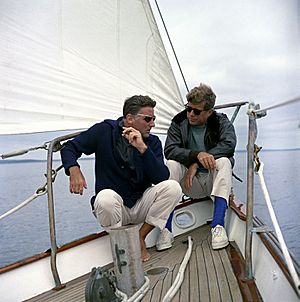
Peter Lawford's first marriage was in 1954 to Patricia Kennedy. She was the younger sister of John F. Kennedy, who was a U.S. Senator at the time. Peter and Patricia had four children: a son, Christopher Lawford (who also became an actor and author), and three daughters named Sydney, Victoria, and Robin.
Peter became a U.S. citizen on April 23, 1960, so he could vote for his brother-in-law in the presidential election. He and other members of the "Rat Pack" helped campaign for Kennedy. Peter and Patricia Kennedy divorced in February 1966.
Peter married his second wife, Mary Rowan, in October 1971. They separated two years later and divorced in 1975. In June 1976, he married Deborah Gould, but they separated after two months and divorced in 1977. Peter then met Patricia Seaton, who became his fourth and final wife in July 1984, just a few months before he passed away.
Death
Peter Lawford passed away on Christmas Eve, December 24, 1984, in Los Angeles. He was 61 years old. He died from heart failure, and he had also been suffering from kidney and liver problems. His body was cremated, and his ashes were first placed at a cemetery. However, due to a disagreement, his ashes were later removed and scattered into the Pacific Ocean off the coast of California by his widow.
Peter Lawford has a star on the Hollywood Walk of Fame for his work in television. It is located at 6920 Hollywood Boulevard. A plaque with his name was also placed at Westwood Village Memorial Park.
Filmography
| Year | Title | Role | Notes |
|---|---|---|---|
| 1930 | Poor Old Bill | Horace | |
| 1931 | A Gentleman of Paris | Child | uncredited |
| 1938 | Lord Jeff | Benny Potter | |
| 1942 | Mrs. Miniver | Pilot | uncredited |
| 1942 | Eagle Squadron | Pilot | |
| 1942 | A Yank at Eton | Ronnie Kenvil | |
| 1942 | Thunder Birds | English Cadet | uncredited alternative title: Soldiers of the Air |
| 1942 | Junior Army | Cadet Wilbur | |
| 1942 | Random Harvest | Soldier | uncredited |
| 1943 | Immortal Sergeant | Soldier | uncredited |
| 1943 | London Blackout Murders | Percy, Soldier on Train | uncredited |
| 1943 | Assignment in Brittany | Navigator | uncredited |
| 1943 | The Purple V | Roger | |
| 1943 | Flesh and Fantasy | Pierrot (Episode 1) | uncredited |
| 1943 | Above Suspicion | Student | uncredited |
| 1943 | Pilot No. 5 | British Soldier | uncredited |
| 1943 | The Sky's the Limit | Naval Commander | uncredited |
| 1943 | The Man from Down Under | Mr. Jones | uncredited |
| 1943 | Someone to Remember | Joe Downes | alternative title: Gallant Thoroughbred |
| 1943 | The West Side Kid | Jerry Winston | |
| 1943 | Sahara | British soldier | uncredited |
| 1943 | Sherlock Holmes Faces Death | Young Sailor at Bar | uncredited |
| 1943 | Corvette K-225 | Naval Officer | uncredited |
| 1943 | Paris After Dark | Frenchman | uncredited |
| 1943 | Girl Crazy | Student | uncredited |
| 1944 | The Adventures of Mark Twain | Young Oxford Celebrant | uncredited |
| 1944 | The White Cliffs of Dover | John Ashwood II as a Young Man | |
| 1944 | The Canterville Ghost | Anthony de Canterville | |
| 1944 | Mrs. Parkington | Lord Thornley | |
| 1945 | The Picture of Dorian Gray | David Stone | |
| 1945 | Son of Lassie | Joe Carraclough | |
| 1945 | Ziegfeld Follies | Porky in "Number Please" | voice, uncredited |
| 1945 | Perfect Strangers | Introduction – USA Version | uncredited alternative title: Vacation from Marriage |
| 1946 | Two Sisters from Boston | Lawrence Tyburn Patterson Jr. | |
| 1946 | Cluny Brown | Andrew Carmel | |
| 1947 | My Brother Talks to Horses | John S. Penrose | |
| 1947 | It Happened in Brooklyn | Jamie Shellgrove | |
| 1947 | Good News | Tommy Marlowe | |
| 1948 | On an Island with You | Lieutenant Lawrence Y. Kingslee | |
| 1948 | Easter Parade | Jonathan Harrow III | |
| 1948 | Julia Misbehaves | Ritchie Lorgan | |
| 1949 | Little Women | Theodore "Laurie" Laurence | |
| 1949 | The Red Danube | Major John "Twingo" McPhimister | |
| 1950 | Please Believe Me | Jeremy Taylor | |
| 1951 | Royal Wedding | Lord John Brindale | alternative title: Wedding Bells |
| 1952 | Just This Once | Mark MacLene IV | |
| 1952 | Kangaroo | Richard Connor | alternative title: The Australian Story |
| 1952 | You for Me | Tony Brown | |
| 1952 | The Hour of 13 | Nicholas Revel | |
| 1953 | Rogue's March | Captain Dion Lenbridge / Private Harry Simms | |
| 1954 | It Should Happen to You | Evan Adams III | |
| 1956 | Sincerely, Willis Wayde | Willis Wayde | |
| 1959 | Never So Few | Captain Grey Travis | alternative title: Campaign Burma |
| 1960 | Ocean's 11 | Jimmy Foster | |
| 1960 | Exodus | Major Caldwell | |
| 1960 | Pepe | Himself | |
| 1962 | Sergeants 3 | Sergeant Larry Barrett | |
| 1962 | Advise & Consent | Senator Lafe Smith | |
| 1962 | The Longest Day | Brigadier Lord Lovat | |
| 1963 | Johnny Cool |
|
executive producer |
| 1964 | Dead Ringer | Tony Collins | alternative title: Dead Image |
| 1965 | Sylvia | Frederic Summers | |
| 1965 | Harlow | Paul Bern | |
| 1965 | Billie |
|
executive producer |
| 1966 | The Oscar | Steve Marks | |
| 1966 | A Man Called Adam | Manny | |
| 1967 | Dead Run | Stephen Daine | alternative titles: Deux Billets pour Mexico, Geheimnisse in goldenen Nylons, Segreti che scottano |
| 1968 | Walls Of Sin | Papá Baroni | alternative titles: Quarta parete, La Limite du péché |
| 1968 | Salt and Pepper | Christopher Pepper | executive producer |
| 1968 | Buona Sera, Mrs. Campbell | Justin Young | |
| 1968 | Skidoo | Senator Humble | |
| 1969 | Hook, Line & Sinker | Dr. Scott Carter | |
| 1969 | The April Fools | Ted Gunther | |
| 1970 | One More Time | Christopher Pepper / Lord Sydney Pepper | executive producer |
| 1970 | Togetherness | Prince Solomon Justiani | |
| 1971 | Clay Pigeon | Government Agent | Alternative title: Trip to Kill |
| 1972 | They Only Kill Their Masters | Lee Campbell | |
| 1974 | That's Entertainment! | Himself, Co-Host | |
| 1975 | Rosebud | Lord Carter | |
| 1976 | Won Ton Ton, the Dog Who Saved Hollywood | Slapstick Star | |
| 1979 | Angels Revenge | Burke | alternative title: Angels' Brigade Seven from Heaven |
| 1980 | Gypsy Angels | ||
| 1981 | Body and Soul | Big Man | |
| 1983 | Where Is Parsifal? | Montague Chippendale | final film role |
| Year | Title | Role | Notes |
|---|---|---|---|
| 1953 | General Electric Theater | John | episode: "Woman's World" |
| 1953–1954 | The Ford Television Theatre | Various roles | 3 episodes |
| 1954–1955 | Dear Phoebe | Bill Hastings | 32 episodes |
| 1954–1957 | Schlitz Playhouse of Stars | Various roles | 3 episodes |
| 1955 | Jane Wyman Presents The Fireside Theatre | Stephen | episode: "Stephen and Publius Cyrus" |
| 1955 | Alfred Hitchcock Presents | Charlie Raymond | episode: "The Long Shot" |
| 1955 | Screen Directors Playhouse | Tom Macy | episode: "Tom and Jerry" |
| 1956 | Playhouse 90 | Willis Wayde | episode: "Sincerely, Willis Wade" |
| 1956–1957 | Studio 57 | Various roles | 2 episodes |
| 1957 | Producers' Showcase | Lord Brinstead | episode: "Ruggles of Red Gap" |
| 1957 | Climax! | Tom Welles | episode: "Bait for the Tiger" |
| 1957–1959 | The Thin Man | Nick Charles | 72 episodes |
| 1958 | The Bob Cummings Show | Himself | episode: "Bob Judges a Beauty Pageant" |
| 1959 | Goodyear Theatre | Major John Marshall | episode: "Point of Impact" |
| 1961 | The Jack Benny Program | Lord Milbeck | episode: "English Sketch" |
| 1962 | Theatre '62 | Glen Morley | episode: "The Farmer's Daughter" |
| 1965 | The Alfred Hitchcock Hour | Ernie Mullett | episode: "Crimson Witness" |
| 1965 | Profiles in Courage | General Alexander William Doniphan | episode: "General Alexander William Doniphan" |
| 1965 | Bob Hope Presents the Chrysler Theatre | Lieutenant Philip Cannon | episode: "March From Camp Tyler" |
| 1966 | Run for Your Life | Larry Carter | episode: "Carnival Ends at Midnight" |
| 1966 | The Wild Wild West | Carl Jackson | episode: "The Night of The Returning Dead" |
| 1967 | How I Spent My Summer Vacation | Ned Pine | television movie |
| 1967 | I Spy | Hackaby | episode: "Get Thee to a Nunnery" |
| 1971 | A Step Out of Line | Art Stoyer | television movie |
| 1971 | The Virginian | Ben Hunter | episode: "The Town Killer" |
| 1971 | Ellery Queen: Don't Look Behind You | Ellery Queen | television movie |
| 1971–1973 | The Doris Day Show | Dr. Peter Lawrence | 8 episodes |
| 1972 | Bewitched | Harrison Woolcott | episode: "Serena's Richcraft" |
| 1974 | The Phantom of Hollywood | Roger Cross | television movie |
| 1974 | Born Free | John Forbes | episode: Pilot |
| 1977–1982 | Fantasy Island | Various roles | 4 episodes |
| 1978 | Hawaii Five-O | Kenneth Kirk | episode: "Frozen Assets" |
| 1979 | The Love Boat | Teddy Smith | 1 episode |
| 1979 | Highcliffe Manor | The Narrator | 6 episodes |
| 1979 | Supertrain | Quentin Fuller | episode: "A Very Formal Heist" |
| 1979 | Mysterious Island of Beautiful Women | Gordon Duvall | television movie |
| 1981 | The Jeffersons | Museum Guide (Voice) | episode: "The House That George Built" |
Radio Appearances
| Year | Program | Episode/source |
|---|---|---|
| 1949 | Lux Radio Theatre | Green Dolphin Street |
| 1953 | Suspense | The Moonstone |
See also
 In Spanish: Peter Lawford para niños
In Spanish: Peter Lawford para niños
 | Sharif Bey |
 | Hale Woodruff |
 | Richmond Barthé |
 | Purvis Young |


